University sector leaders chart the way ahead
The state’s unis are in uncharted waters, losing core teaching revenue and facing disruption to students and staff. Now, their leaders are setting their compass to get through uncertain times.
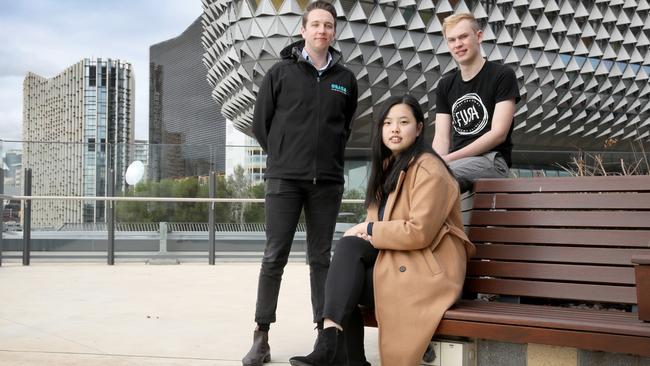
SA News
Don't miss out on the headlines from SA News. Followed categories will be added to My News.
Universities are facing extraordinary financial challenges at the same time as their services are needed more than ever to help the community stay safe and recover from the pandemic in health, finance and wellbeing. Key leaders chart the way ahead for SA’s unis.
Flinders University vice-chancellor Colin Stirling
We’re very determined to meet the target we set in our strategic plan, The 2025 Agenda, of Flinders University becoming a top ten university in Australia.
We reviewed our strategic plan this month and it was clear it is still relevant and fit for purpose, if anything we needed to double down on implementation.
The pandemic may have slowed our trajectory temporarily but the changes already made, pre-COVID-19, positioned us well to face the challenges.
That’s been very gratifying.
I’m confident we will emerge from this in as strong a position as is possible.
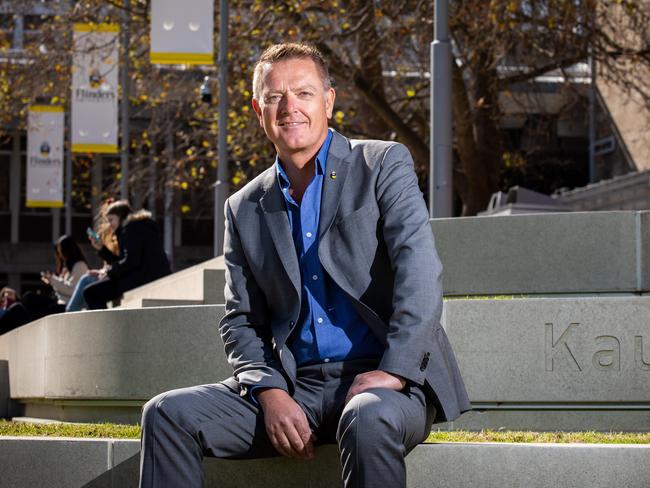
The Federal Government’s very recent proposals would reduce funding on almost every course taught by universities. This is an interesting time to reduce funding for domestic students when universities are already reeling from the financial consequences of COVID-19 on the international student market. The proposals would also cut costs to the Commonwealth further by doubling the fees paid by students in certain disciplines. Our universities play important roles in society and in economic growth. The Government should focus more on the value of the investments it makes in Australia’s future through education and research rather than simply counting it as a cost in the ledger.
In terms of the community and business, we are working hard to form genuine partnerships with them so that we can work together to deliver outcomes that make a genuine difference both locally and globally.
As careers and jobs change so rapidly in the new world, our graduates must be prepared with the skills they need to be successful in the rapidly evolving world of work.
We’ll welcome students back for a master’s degree or for short courses that enable them to take the next step or even leap in their career.
The bottom line is that we will support students to learn what they need to succeed in their future careers. That’s our prime motivation.
UniSA vice-chancellor David Lloyd
There are many things that need to happen to address the challenge to the sector.
Firstly, we have to be able to deliver international education in the near term.
The Federal Government could facilitate mechanisms to fully enrol students while offshore.
We have many students applying to be here next year but we can’t engage them because they need a student visa and other things to be in place.
If the policy settings changed so they could get a provisional visa, we could enrol those students, we could start to deliver education to them online while they are offshore and then as borders open and flights resume they can transition safely and arrive here.
That would help derisk the business model for the university sector.
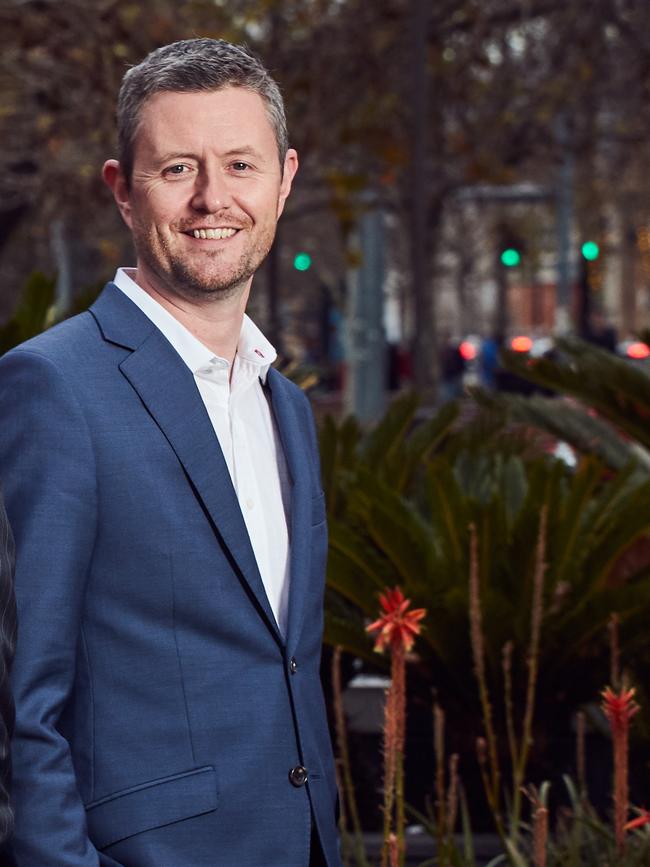
Then, we have Premier Steven Marshall sitting on the national Cabinet.
He’s in a strong position to advocate for universities and the role they play in the state and to call for increased domestic participation.
SA, Queensland and Tasmania can make a case that our participation rates of young people in higher education are significantly below the national rate.
The Premier can continue to champion the case to increase the number of funded places – Commonwealth funded – to the national rate, which would reduce unemployment of our young people.
If we do this in areas of state priority such as food, wine, agriculture, tourism, space, technology, cyber and defence then we’ll have a workforce that’s ready for the rebound.
Universities are good, large employers, we tend to retain our staff. Our research enterprise drives spin-outs and new technology. Systems research lifts productivity. It makes sense that we protect universities as a primary industry for SA
Adelaide University acting vice-chancellor Mike Brooks
Given the disruptive impact of COVID-19 and the financial challenges of 2020-21, the University is currently reviewing the speed of implementation of our strategy and some of its priorities.
Nevertheless, we’re continuing with a range of initiatives as part of our strategic direction, even in the face of the many challenges posed by the global pandemic. This includes our strong focus on education and research for the benefit of industry, which is now more critical than ever as our State looks to recover from the impacts of COVID-19.
We continue to pursue our industry engagement priorities across key sectors for the State: defence, cyber and space; health and biotech; agrifood and wine; energy, mining and resources; and creativity and culture. Each of these is well supported with an Industry Advisory Panel, which maintains a regular dialogue with the University about the education and research needs of industry.
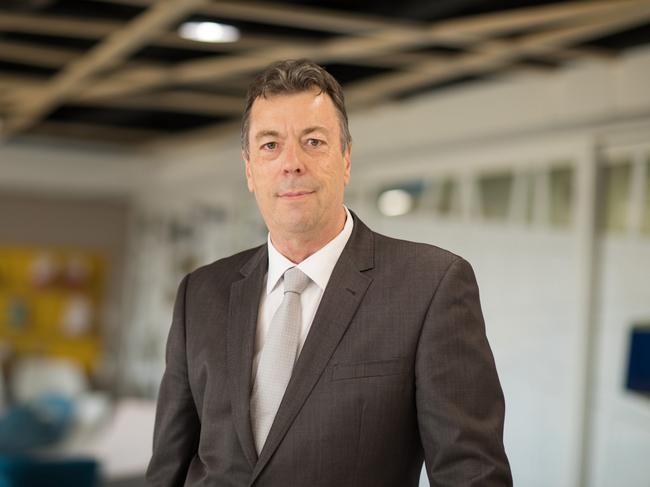
We are continuing with our Top Talent recruitment in areas of key need for the University and for the State’s capabilities in a range of fields. These include new senior appointments in cybersecurity, decision agriculture, developmental health, quantum materials and other fields. The University has already made a series of Top Talent appointments in the fields of machine learning, cancer clinical trials, health equity, neuroimaging, critical minerals, plant synthetic biology, and international security.
We will make further announcements about significant developments in these fields, which are important to the University’s strategic direction and to the economic development of the State.
Federal Education Minister Dan Tehan
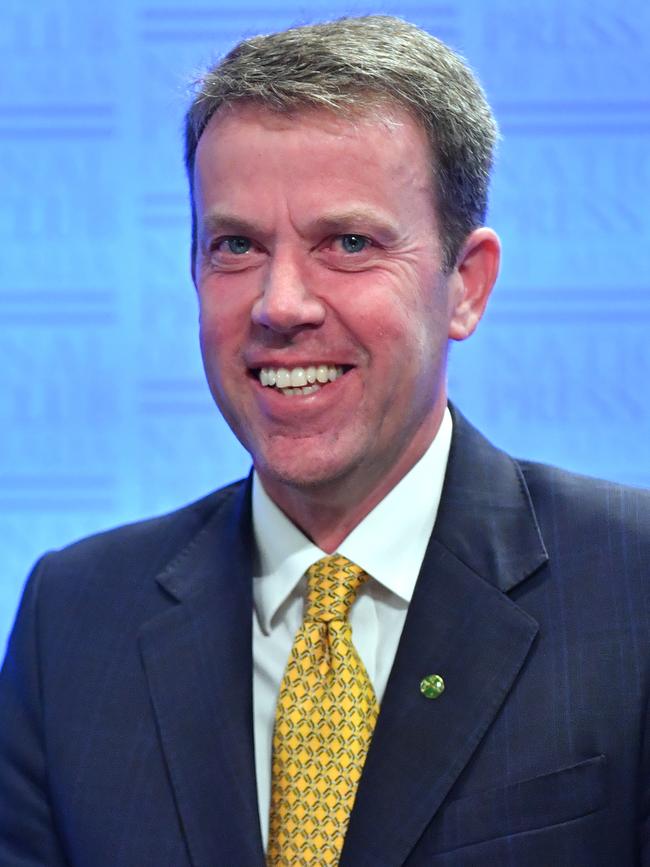
We are facing the biggest jobs crisis since the Great Depression and our university system must respond by strengthening its focus on Australian students.
The Federal Government will grow the number of university places for domestic students to 39,000 in 2023 and 100,000 in ten years.
We will encourage students to tailor their studies to learn the skills that will be in demand in areas of future jobs growth. That means breaking down the traditional degree “silos” by choosing units of study across disciplines and introducing a price signal to students by making degrees cheaper in areas of expected job growth.
The Australian Government already provides more than $18 billion a year to fund our universities and this will grow to $20 billion by 2024.
Federal Opposition Education spokeswoman Tanya Plibersek
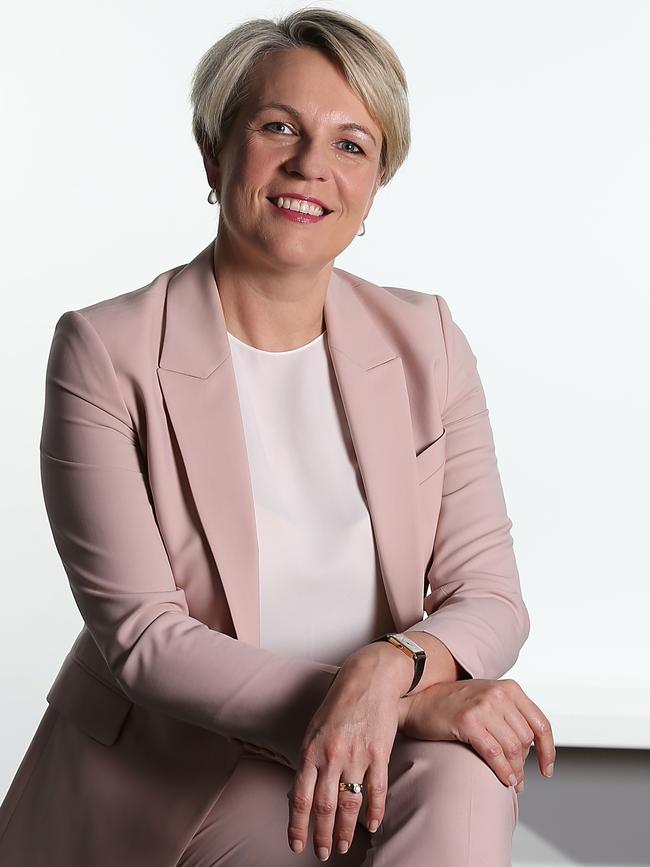
South Australia’s universities will help lift our economy out of recession. They are educating the doctors, nurses, teachers, scientists, engineers, and businesspeople of the future.
That’s why we can’t understand why Scott Morrison is making it harder and more expensive to go to uni.
When it comes to unis, all the Liberals know how to do is jack up fees and lock students out.
Every one of Scott Morrison’s Liberal Party Cabinet ministers went to uni, but they don’t think our kids deserve the same chance.
Labor believes that if you get the marks and are prepared to study hard you should get the opportunity to go to uni – simple as that.
State Education Minister John Gardner
Through the coronavirus pandemic, there has been an unprecedented level of co-operation between the State Government and our universities.
The Premier and Ministers have met with the vice-chancellors weekly to discuss the shared challenges and urgent needs of our universities, their staff and students.
University education is one of South Australia’s largest exports, and the fantastic work of our public health officials in handling the pandemic will present our universities with significant opportunities, particularly with regards to attracting international students in the years ahead.
We will continue to work with and support our universities in important areas of reform and innovation going forward, especially as the strategic goals of our State Government and our universities come more closely into alignment.
By working together, we will give local businesses and students the best opportunity to harvest the opportunities ahead.
Opposition Education spokeswoman Susan Close
The premier needs to decide if he is going to side with SA universities or with the federal government that has gone to war with them.
He should offer payroll relief so they don’t have to sack staff and stop doing vital research.
He should insist Canberra lift the cap on domestic students so more young people can get an education.
He should come out and say that the plan for doubling some student fees should be binned – it will cost universities and students and is the last thing a country that wants a high performing workforce should be doing.
Stella Woo, president of the Adelaide University Union board.
There will be many challenges in coming months with the restrictions starting to be lifted, such as bring back face-to-face classes, welcoming the students, especially first-year students (as many of them would have missed out on meeting new people and adjusting to university life). There have been instances of racism around Australia, so it would be important to ensure that it does not occur on campus once students return. Students being able to support each other would be the most important way to go through this situation. Financial support from the government would also be needed as the current situation has put the university through difficult times.
MORE NEWS
SA could record dozens of coronavirus cases within days
Artists fear for futures as rescue funds miss their mark
Adelaide Oval must be SA’s World Cup super-sub
Sean Henschke, general-secretary of Flinders University Student Association.
I am looking forward to on-campus activity and the student community returning after the restrictions ease, though I have grave concerns for the proposed anti-students cuts by the Liberal Federal Government.
The next 18 months will be a challenging time for the university community, both for staff who are facing increasingly insecure work and students who are facing increasing barriers to accessing tertiary education.
Noah Beckmann, president of UniSA Student Association.
It will be an interesting time in higher education over the next 18 months.
Of note are the recent attacks on higher education by the Federal Government which could be a huge detriment to students, with there being an overall cut to the funding of the sector, meaning potential reduction in the quality of teaching and learning.
Even though students may be coming back to campus and restrictions are easing, there is still great uncertainty within the student cohort as to what the future will hold for them.
Universities Australia chief executive Catriona Jackson
A key part of SA’s post-pandemic economic recovery is having a skilled, educated workforce.
Before COVID-19, universities were already anticipating an increase in demand for student places due to demographic factors. In a recession, demand for a university education also increases. Every percentage point increase in the youth unemployment rate can be expected to produce a similar percentage point increase in school leaver applications. It is important universities are able to accommodate this additional demand.
We welcome the government’s emphasis on participation in university education. We also welcome the return of indexed funding so universities can keep up with rising costs.
But the reform package overall is highly complex and we continue to study the detail to understand what it means for SA’s universities and for the higher education sector as a whole.
Innovative Research Universities executive director Conor King
Universities have a major role to play in Australia’s COVID-19 revival through developing vaccines, researching the social impact of COVID and re-skilling people who have lost their jobs, but have been largely overlooked in the Government’s COVID recovery plan and so far have been excluded from the big financial support packages.
Even the big funding changes announced recently do not recognise the multi-billion dollar hit to universities caused by COVID-19, which will cause significant funding shortfalls for 2021 and future years.
The Minister’s number one ambition is to improve access to higher education for school-leavers living in regional and remote parts of Australia. The IRU supports that vision. But to make it a reality, the Government needs to ensure universities are financially robust in a post-COVID world.
Australian Technology Network of Universities executive director Luke Sheehy
Universities are South Australia’s and the nation’s partners in building prosperity. Prior to the pandemic, disruption and change in our economic mix already existed.
Manufacturing jobs had vanished, industries that were once the backbone of communities and economies had disappeared or transformed, and technology changed the way we work and live. The recovery from this pandemic will amplify and accelerate this change.
It will be the innovative and strong university sector that will help navigate a quicker and more prosperous recovery.
We stand ready to help workers with the skills and training they need and help our businesses thrive with new ideas, products and market opportunities.
